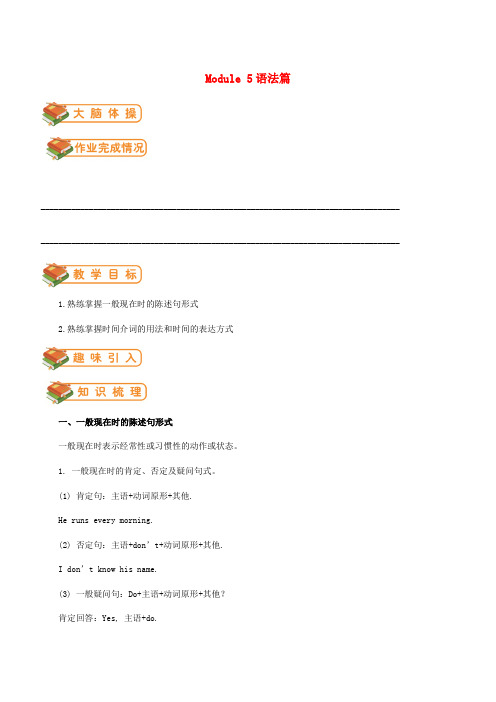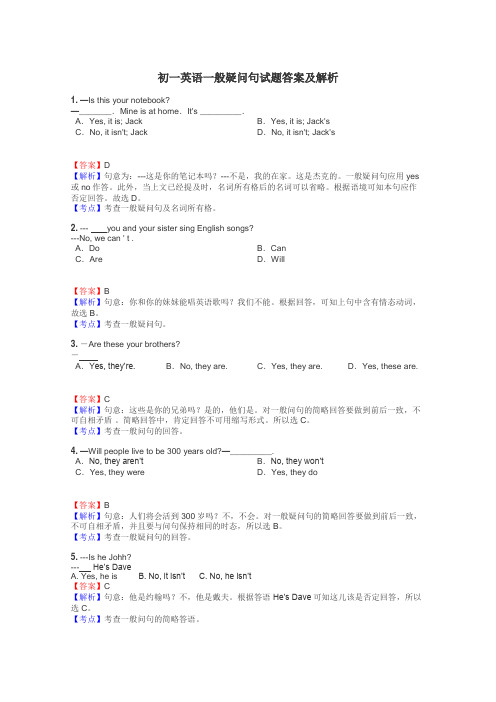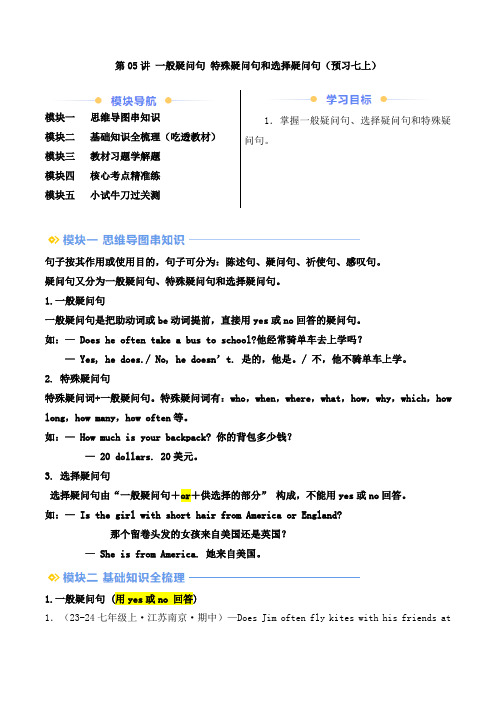七年级英语上册(含答案)一般疑问句一般疑问句
【外研版】七年级英语上册Module5Myschoolday语法篇试题含答案

Module 5语法篇__________________________________________________________________________________ __________________________________________________________________________________1.熟练掌握一般现在时的陈述句形式2.熟练掌握时间介词的用法和时间的表达方式一、一般现在时的陈述句形式一般现在时表示经常性或习惯性的动作或状态。
1. 一般现在时的肯定、否定及疑问句式。
(1) 肯定句:主语+动词原形+其他.He runs every morning.(2) 否定句:主语+don’t+动词原形+其他.I don’t know his name.(3) 一般疑问句:Do+主语+动词原形+其他?肯定回答:Yes, 主语+do.否定回答:No, 主语+don’t.—Do you like maths?—Yes, I do./No, I don’t.(4) 特殊疑问句:疑问词+do+主语+动词原形+其他?When do you have Chinese?2. 在一般现在时中,行为动词前不能有连系动词be。
We don’t go to school on Saturday.3. do除用作助动词之外,还可用作行为动词,意为“做”。
将含有do one’s homework, do housework 等短语的肯定句变为否定句时,不能在原句谓语动词do后只接加not,而是应在do前加don’t或doesn't。
They don’t do their homework in the mornin g.二、时间介词in, on, at用法1. at常用来表示在某点时间,即“在几点几分;在某一时刻”。
如:She usually gets up at 6:00 in the morning. 她通常早上6点起床。
七年级上册Unit3 含有Be动词的一般疑问句的初步运用

根据所提供的情景写出正确的句子
• 1,当你不确定你手上的东西是不是一把尺 子时候,你怎么咨询别人的意见?
Is this a ruler ?
• 2,当你不确定在远处的那个人是否是对方 的父亲,你怎么咨询对方的意见?
Is that your father ?
• 3,当你捡一块橡皮,你想问你的同桌是否 是他的时候,你怎么问?
含有be动词的陈述句变一般疑问句
一调二改三问号
1.“一调” :把be动词调至句首; 2. “二改”: 改大小写; 3. “三问号”:在句末加上问号。
含有be动词的陈述句变为一般疑问句的步骤
This is a pencil.
Is
this
a
pencil?
把下列的句子变为一般疑问句
1.I am Gina. Are you Gina? 2.I am a teacher . Are you a teacher? 3.This is my book. Is this your book? 4.My name is Mike. Is your name Mike?
Is this your eraser ?
总结1:含有be动词的一般疑问句
由“Be + 主语 + 其他部分?”构成要求对方
用 Yes 或 No 回答的疑问句。
总结2,含有 be一般疑问句的构成
• ①一调二改三问号 “一调” :把be动词调至句首; “二改”: 改大小写; “三问号”:在句末加上问号。 • ②特殊I变you, 特殊my变your。
特殊I变you, 特殊my变your
一般疑问句的肯定和否定回答:
1.Is he your brother ? Yes, he is. No, he isn’t
七年级上册Unit 3 语法专项-一般疑问句+配套练习(含答案)

一般疑问句一般疑问句是用来询问事物或某种情况是否属实,需要对方作出肯定或否定回答的句子。
首字母大写,句末问号。
一般疑问句有三种类型:(一)含有be动词(Is,Are开头)的确认物品所属关系的一般疑问句目前所学到的一般疑问句构成是“Be(Am, Is, Are)+主语+其他?”例:Is this your schoolbag?Are these your pencils?✸在回答Are these/those...?句型时,用they代替these/those。
(二)句子中有情态动词Can,Must,把其提到句首1)I can spell it. == > Can you spell it?2) He can speak English. == > Can he speak English?(三)谓语是实义动词原形,在句首借用Does,句中的实义动词恢复回原形。
谓语是实义动词过去式,在句首借用did,句中的实义动词恢复回原形。
1) I have a book . == > Do you have a book?2) They like Chinese . == > Do they like Chinese?3) We come from China. == > Do you come from China?4) She has a small dog. == > Does she have a small dog?5) Maria likes playing sports. == > Does Maria like playing sports ?6) John had some books. == > Did John have any books ?常见的实义动词:like, have, play, think, eat,ask, know, want, sound,need, work, watch,sell, teach,love, buy, take, spell,find, come,taste,look, say, go,✸注意事项:1、肯定和否定回答中必须用人称代词主格,主语为I/we,转化成一般疑问句时, I/We要变为you, my,our变为your。
初一英语一般疑问句试题答案及解析

初一英语一般疑问句试题答案及解析1.—Is this your notebook?—_______.Mine is at home.It's _________.A.Yes, it is; Jack B.Yes, it is; Jack'sC.No, it isn't; Jack D.No, it isn't; Jack's【答案】D【解析】句意为:---这是你的笔记本吗?---不是,我的在家。
这是杰克的。
一般疑问句应用yes 或no作答。
此外,当上文已经提及时,名词所有格后的名词可以省略。
根据语境可知本句应作否定回答。
故选D。
【考点】考查一般疑问句及名词所有格。
2. --- you and your sister sing English songs?---No, we can ' t .A.Do B.CanC.Are D.Will【答案】B【解析】句意:你和你的妹妹能唱英语歌吗?我们不能。
根据回答,可知上句中含有情态动词,故选B。
【考点】考查一般疑问句。
3.-Are these your brothers?-A.Yes, they’re.B.No, they are.C.Yes, they are.D.Yes, these are.【答案】C【解析】句意:这些是你的兄弟吗?是的,他们是。
对一般问句的简略回答要做到前后一致,不可自相矛盾。
简略回答中,肯定回答不可用缩写形式。
所以选C。
【考点】考查一般问句的回答。
4.—Will people live to be 300 years old?—_________.A.No, they aren’t B.No, they won’tC.Yes, they were D.Yes, they do【答案】B【解析】句意:人们将会活到300岁吗?不,不会。
对一般疑问句的简略回答要做到前后一致,不可自相矛盾,并且要与问句保持相同的时态,所以选B。
译林版2024新版七年级英语上册第05讲 一般疑问句 特殊疑问句和选择疑问句

第05讲一般疑问句特殊疑问句和选择疑问句(预习七上)模块一思维导图串知识模块二基础知识全梳理(吃透教材)模块三教材习题学解题模块四核心考点精准练模块五小试牛刀过关测1.掌握一般疑问句、选择疑问句和特殊疑问句。
句子按其作用或使用目的,句子可分为:陈述句、疑问句、祈使句、感叹句。
疑问句又分为一般疑问句、特殊疑问句和选择疑问句。
1.一般疑问句一般疑问句是把助动词或be动词提前,直接用yes或no回答的疑问句。
如:— Does he often take a bus to school?他经常骑单车去上学吗?—Yes, he does./ No, he doesn’t. 是的,他是。
/ 不,他不骑单车上学。
2. 特殊疑问句特殊疑问词+一般疑问句。
特殊疑问词有:who,when,where,what,how,why,which,how long,how many,how often等。
如:— How much is your backpack? 你的背包多少钱?— 20 dollars. 20美元。
3. 选择疑问句选择疑问句由“一般疑问句+or+供选择的部分”构成,不能用yes或no回答。
如:— Is the girl with short hair from America or England?那个留卷头发的女孩来自美国还是英国?— She is from America. 她来自美国。
1.一般疑问句 (用yes或no 回答)1.(23-24七年级上·江苏南京·期中)—Does Jim often fly kites with his friends atweekends?—________. He likes flying kites very much.A.Yes, he is B.Yes, he does C.No, he doesn’t 2. 特殊疑问句(问什么答什么)2.(23-24七年级上·江苏盐城·期末)—________ woman is Daniel’s mother? —The one in the red coat.A.What B.Where C.Who D.Which3. 选择疑问句(选什么答什么)注意:不要错看成一般疑问句。
人教版英语七年级上册一般疑问句和特殊疑问句

一般疑问句和特殊疑问句【概念引入】英语中的句子按照句式可以分为陈述句、疑问句、祈使句和感叹句。
一、陈述句用来说明事实或说话人的看法;分为肯定句和否定句。
例如:My name is Lily. 我的名字叫莉莉。
(肯定句)She isn’t a teacher. 她不是一个老师。
(否定句)二、祈使句用来表示请求、命令、劝告和建议等。
例如:Open the door please! 请打开门。
三、感叹句用来表达强烈的感情。
例如:What a beautiful girl she is!她真是个漂亮的女孩儿啊!四、疑问句用来提出问题。
例如:Are you my new teacher? 你是我的新老师吗?本节课,我们将重点讲解疑问句的用法。
【用法讲解】疑问句可以分为一般疑问句、特殊疑问句、选择疑问句和附加疑问句。
本册书中我们重点学习的是一般疑问句和特殊疑问句。
1.一般疑问句。
(1)什么是一般疑问句?可以用Yes或者No来回答的疑问句是一般疑问句。
一般疑问句读的时候往往要用升调;译成汉语的时候常可以译为“……吗?”。
例如:-Are you a student? 你是个学生吗?-Yes, I am. 是的,我是。
-Can you speak English? 你会说英语吗?-Yes, I can. 是的,我会。
-Do you go to school every day? 你每天都上学吗?-No, I don’t. 不,不是。
(2)如何将陈述句变成一般疑问句?①句中有be动词(am,is,are,was,were等)、助动词(do,does,did,have,had等)或情态动词(can,must,will,may等)时,将其提到句首,句末加上问号即可。
例如:She is a clever girl. 她是个聪明的女孩。
→Is she a clever girl? 她是个聪明的女孩吗?I can swim. 我会游泳。
初一英语上册:含be动词一般疑问句考点
初一英语上册:含be动词一般疑问句考点含be动词的疑问句1. 一般疑问句(1)含be动词的一般疑问句的结构为"Be (Am, Is, Are)+主语+其他? "am, is或are的首字母要大写。
注意:当把含有be动词的肯定句变为一般疑问句时,通常将I变为you,be动词也要相应地变为are;同样,肯定句中的形容词性物主代词my,变一般疑问句时要改为your。
►I am a teacher.我是老师。
→Are you a teacher? 你是老师吗?►This is my book.这是我的书。
→Is this your book? 这是你的书吗?(2)一般疑问句分别用Yes或No作肯定或否定回答。
肯定回答:Yes, 主语+be (am, is, are).。
否定回答:No, 主语+be (am, is, are)not.。
在简略的答语中,主语要由人称代词的主格充当。
►—Is he Mike? 他是迈克吗?—Yes, he is./No, he isn’t. 是的,他是。
/不,他不是。
(答语中的he 不能用Mike)。
Is this/that…? 结构的一般疑问句的答语要用Yes, it is.或No, it isn’t.。
另外,Are these/those…?结构的一般疑问句的答语要用Yes, they are.或No, they aren’t.。
►—Is that your ruler? 那是你的尺子吗?—Yes, it is./No, it isn’t. 是的,它是。
/不,它不是。
►—Are those his dictionaries? 那些是他的词典吗?—Yes, they are./No, they aren’t. 是的,它们是。
/不,它们不是。
2. 特殊疑问句含be动词的特殊疑问句的常见结构为"疑问词+be+主语+其他?"或"疑问词+be+其他?"在把一个陈述句变特殊疑问句时,先将句子变为一般疑问句,然后在一般疑问句前加上适当的疑问词(what,who, how, what color等)。
七年级上册英语全单元重点句型总结
七年级上册英语全单元重点句型总结一、祈使句及其反义疑问句1. 祈使句的句型为"动词原形+其他",用于表示请求、命令或建议。
例句:Close the door. (关上门。
)2. 祈使句的反义疑问句的结构为"动词原形+其他+will/would/can/could+主语",用于表示疑问、请求或建议。
例句:Open the window, will you? (打开窗户,好吗?)二、一般疑问句及其回答1. 一般疑问句的句型为"助动词/情态动词+主语+动词原形+其他",用于询问事实或情况。
例句:Are you a student? (你是学生吗?)2. 一般疑问句的回答可以用"Yes, 主语+助动词/情态动词"或"No, 主语+助动词/情态动词+not"。
例句:Yes, I am. (是的,我是。
)三、选择疑问句及其回答1. 选择疑问句的句型为"选择疑问词+be/助动词/情态动词+主语+其他",用于提出选择问题。
例句:Where is your school? (你的学校在哪里?)2. 选择疑问句的回答通常是用冒号引导的简短陈述句。
例句:In Qingdao. (在青岛。
)四、特殊疑问句及其回答1. 特殊疑问句的句型为"特殊疑问词+be/助动词/情态动词+主语+其他",用于询问特殊信息。
例句:What's your name? (你叫什么名字?)2. 特殊疑问句的回答是根据问题的具体情况而定,通常是对问题的具体信息做出回答。
例句:My name is Tom. (我的名字叫汤姆。
)五、陈述句及其否定句1. 陈述句的句型为"主语+be/助动词/情态动词+其他",用于陈述事实、描述情况。
例句:She is from France. (她来自法国。
七年级英语上 问句综合
七年级上一般疑问句+ 特殊疑问句一、一般疑问句:1. Are you Helen ? Yes, I am. /No, I'm not.2. Are those your parents? -3. Are those books yours?-Yes, they are. No, they aren't.4.- Are the green sweaters 10 dollars?-Yes, they are. No, they aren't.5.. -Are their birthdays on December twelfth (12th)-Yes, they are. No, they aren't6.- Are their favorite subjects PE or history?-Yes, they are. No, they aren't7.-Is the man your uncle? --Yes, he is. No, he isn't8--.Is she your sister? --Yes, she is. No, she isn't.9.-- Is this boy your brother ? --Yes, he is .No he isn't.10. --Is this / that your pencil? --Yes, it is. No, it isn't.11.-- Is your book under the desk? --Yes, it is. No, it isn't. 12--.Is the blue sweater 10 dollars? --Yes. it is.13. --Is his birthday on August 5th ?--14. --Is Mr. Xie his music teacher?--15.-- Is his favorite subject science?--16.--Is Jane 10 years old ? --17.-- Do you have a soccer ball?--18.-- Do they have a volleyball?--19--. Does he/she like bananas ?--20.-- Does Sally like swimming?--21.--Do Tom and Bill like vegetables?--16.--Do your parents like salad?--17.--can Jim speak English well?--二、特殊疑问句:1.--What's your first name/last name?--2.--What's this in English? --3.--What's your/her/his phone number? --4.--what's your /her /his favorite subject? --5.--what are these /those? --6.--What's the date today? It's on December 12th.--7.--What color is the blue jacket? --8. --what color do you want? --9.--What subject do you like best?--10. --What sport/ fruit do you like?--11.-- which subject do you like?--12--.what day is it today?It's Monday?--13..--Who are they?--14.--Who's your Chinese teacher?--15.Who's the man....? -- 15--.How old are you?--16.--How old is she? --17. --How are you these days?--18.--How much is the green sweater?--19.--How much are these blue socks? --20.-- How much water do you want?--21.--How many people are there in your family?--22.--How many subjects do you have this term?--23.--How long does the art lesson last? --For two hours24. --When is his birthday?-- It's on May1st.25.--When is Sally's birthday? --It's in June26.--When is your father's birthday?--It's on Teachers'Day.27.--When is your art class? --It's on Tuesday.28.--Why do you like P.E.? --Because it's fun.29.--Why does. Bob like history? --Because it's interesting.29.--where is my book? --It's in the bookcase30.--where are their keys? -- They are on the desk.。
英语人教新目标七年级上册一般疑问句(1)
1.some He has some books.
2.and
Does he have any books? I have a pen and a pencil.
Do you have a pen or a pencil?
3.does(do) He often does homework at night.
Does he often do homework at night?
Practice 1. These are some photos.
Are these any photos ?
2.Mary does her homework at school.
Does Mary do her homework at school?
3.He goes to school with Tom. Does he go to school with Tom?
4.His mother often plays volleyball.
Does his mother often play volleyball?
一加,二改,三问号!
总结
如 何 改 一 般 疑 问 句 ?
3. you can sing and dance. Can I sing or dance?
4. He plays soccer.
Does he play soccer ?
5. We like English. Do you like English ?
回顾小结
•一提、二改、三问号。 •一加、二改、三问号。
我们学过的一般疑问句有几种类型呢?
1)以be动词开头 (am、are、is)
例: Am I OK ? Are you OK ? Is he OK ?
- 1、下载文档前请自行甄别文档内容的完整性,平台不提供额外的编辑、内容补充、找答案等附加服务。
- 2、"仅部分预览"的文档,不可在线预览部分如存在完整性等问题,可反馈申请退款(可完整预览的文档不适用该条件!)。
- 3、如文档侵犯您的权益,请联系客服反馈,我们会尽快为您处理(人工客服工作时间:9:00-18:30)。
2020年全国中考英语试题专题练习:一般疑问句
一、选择题
1、“Excuse me, sir. ____ you help me, please?” “Certainly.”
A. Could
B. Do
C. Will
D. Are
2、— What club does George want to join?
— The art club.
— _________
— I think so.
A. Can he paint well?
B. Does he paint well or bad?
C. What can he do in the club?
D. When does the club open?
3、— Good afternoon, Mr Brown. _________
— Yes, he's at home. Come in, please.
— Thank you.
A. Where is Jim?
B. Is Jim in?
C. Are you Kate's mother?
D. Does Kate like to go out?
4、–Have you read today’s newspaper?–No. _______ there lots of sports news in it?
A. Are
B. Is
C. Was
D. Were
5、— there a supermarket near your school?
—Yes, there’s one on Long Street.
A. Are
B. Does
C. Do
D. Is
6、—_______you_______ have dinner with me this afternoon? —Yes, I’d love to. A.Would, like B.Do, like to C.Will, like to D. Would, like to
7、____ a new building _____ in your school last year
A . Is; built
B .was; built
C .Does; build
D .did; build
8、—________ there any living things on other planets?
—I have no idea. Maybe we can know more about that in the future.
A. Is
B. Are
C. Has
D. Have
9、— your friend like English?
— Yes, he does.
A. Does
B. Do
C. Is
D. Has
10、Only in this way .
A. you can succeed
B. can you succeed
C. you will succeed
D. can you succeeded
11、——He’s never read the book The Adventure of Tom Sawyer, _________ he? ——_________. He told me it’s very interesting. He’d like to read it again.
A. is, No, he isn’t.
B. is, Yes, he is.
C. has, No, he hasn’t.
D. has, Yes, he has.
12、------_______you ______play football?
----Yes, you are right.
A. Are….using to B.Do…e to C.Did…e to D.Will….use to
13、They have never been to New York, _______?
A. have they
B. haven't they
C. don't they
D. didn't they
14、-- _____ your parents like watching TV at night?
--No, they _____.
A. Does; doesn’t
B. Do, don’t
C. Does, do
D. Do, do
15、_____ Peter and Jim _____ hamburgers?
A. Does, like
B. Do, like
C. Does, likes
D. Do, likes
16、-- ________________. --Yes, please. I want a T-shirt for my daughter.
A . What do you like? B. Do you like a T-shirt?
C. Can I help you?
D. Can you help me?
17、-______ he______ at this school last term?
-Yes, I think so.
A. Did, study
B. Has, studied
C. Was, study
D. Did, studied
18、________you often late for school?
A. Do
B. Does
C. Is
D. Are
19、_____ Peter and Jim _____ hamburgers?
A. Does, like
B. Do, like
C. Does, likes
D. Do, likes
20、 _________ he ________ many good friends?
A.Does, have B. Do, have C. Does, has D. Are, have
21、— ____ we go to the zoo tomorrow afternoon? —Good idea.
A. Are
B. Shall
C. Do
D. will
22、—_______ she _______ well? — Yes, she can
A.Does, dance B.Can, dance C.Is, dancing D. can, dances
23、there lots of on the hill?
A. Is; sheep
B. Is; sheeps
C. Are; sheeps
D. Are; sheep
24、—____ you Mingming?
—____, I’m not.
A. Are; Yes
B. Am; No
C. Are; No
D. Am; Yes
25、_____ pandas from China?
A. Are
B. Is
C. Do
26、--_______ he ________ breakfast at home? -- Yes.
A. Dose, have
B. Does, have
C. Does, has
参考答案
一、选择题
1、A
2、A
3、B
4、B
5、D
6、D
7、B
8、B
9、A
10、B
11、 D
12、C
13、B
14、B
15、B
16、C
17、B
18、D
19、B
20、A
21、B
22、B
23、D
24、C 本题由语境可知考查be动词及对一般疑问句的回答。
在需要be动词的情况下, 第一人称单数(I)和第二人称(you)分别用am, are。
对一般疑问句的肯定回答用Yes, …;否定回答用No, … not. 故选C。
25、A
26、B。
